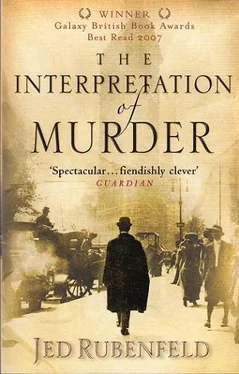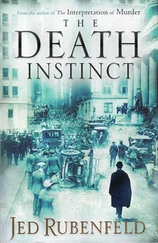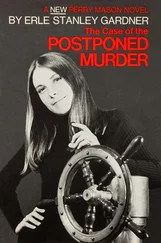Jed Rubenfeld - The Interpretation of Murder
Здесь есть возможность читать онлайн «Jed Rubenfeld - The Interpretation of Murder» весь текст электронной книги совершенно бесплатно (целиком полную версию без сокращений). В некоторых случаях можно слушать аудио, скачать через торрент в формате fb2 и присутствует краткое содержание. Жанр: Исторические приключения, на английском языке. Описание произведения, (предисловие) а так же отзывы посетителей доступны на портале библиотеки ЛибКат.
- Название:The Interpretation of Murder
- Автор:
- Жанр:
- Год:неизвестен
- ISBN:нет данных
- Рейтинг книги:5 / 5. Голосов: 1
-
Избранное:Добавить в избранное
- Отзывы:
-
Ваша оценка:
- 100
- 1
- 2
- 3
- 4
- 5
The Interpretation of Murder: краткое содержание, описание и аннотация
Предлагаем к чтению аннотацию, описание, краткое содержание или предисловие (зависит от того, что написал сам автор книги «The Interpretation of Murder»). Если вы не нашли необходимую информацию о книге — напишите в комментариях, мы постараемся отыскать её.
The Interpretation of Murder — читать онлайн бесплатно полную книгу (весь текст) целиком
Ниже представлен текст книги, разбитый по страницам. Система сохранения места последней прочитанной страницы, позволяет с удобством читать онлайн бесплатно книгу «The Interpretation of Murder», без необходимости каждый раз заново искать на чём Вы остановились. Поставьте закладку, и сможете в любой момент перейти на страницу, на которой закончили чтение.
Интервал:
Закладка:
The club's hat-check girl, greeting Jung in the foyer, was momentarily disconcerted when he drew his revolver. But he handed it to her with European politeness, explaining that, having seen a policeman a few doors down, he was concerned that there might be some murderer abroad. 'It's okay,' said the girl, smiling prettily at him. 'For a second there, I thought you were the murderer.'
As the two of them laughed and the front door was shut, a different man stepped out of a carriage in the shadows of Calvary Church. The cab drove away, leaving this man by himself in almost the very spot that Jung had occupied the night before. He was dressed in white tie. Despite the summer evening heat, he wore yet another layer of clothing, an overcoat, as well as white deerskin gloves. His hat was pulled low to cover as much of his face as possible. The man did not move. He watched from the darkness, where the policemen at the Actons' house could not see him.
As soon as he heard the door shut, Smith Jelliffe went to his telephone. He asked an operator to connect him to the Matteawan State Hospital. It took fifteen minutes, but Jelliffe at last got through to a hospital guard with whom he was on excellent terms. Jelliffe began issuing frantic commands, but he was quickly interrupted.
'You're too late,' said the guard. 'He's gone.'
'Gone?'
'He left three hours ago.'
Jelliffe put down the receiver. With nervous fingers, he dialed the number of Charles Dana's Fifth Avenue home. There was no answer. It was nearing midnight. After six rings, Jelliffe hung up.
'Dear God,' he said.
Across the street from the Balmoral, Littlemore said goodbye to Greta under a streetlamp. The night was as hot and muggy as they came. 'I can say he came in Sunday night,' Greta volunteered, 'if you want me to.'
Littlemore had to laugh. He shook his head, hailing a passing cab.
'You aren't going to look for my Fannie now, are you?' she asked forlornly.
'No, I'm not going to look for her,' Littlemore said. 'I'm going to find her.'
He told the driver Fortieth Street and gave the man a dollar to cover the fare. Greta stared at him. 'You're a pistol, you know that?' she said. 'You wouldn't want to marry me, by any chance? We're both redheads.'
Littlemore laughed again. 'Sorry, sugar, I'm spoken for.'
Greta kissed him on the cheek. As the cab drove off, Littlemore turned around to find Betty Longobardi standing right behind him. On his way uptown, the detective had made a stop at the Longobardis', leaving word for Betty to meet him at the Balmoral as soon as she got home.
'Start explaining,' said Betty, 'and make it good.'
Littlemore did not explain. Instead, he said she'd just have to trust him, then led her to his parked car. From the trunk, the detective drew out a lumpy sack. 'I need to show you some things that might have belonged to Miss Riverford. You're the only one who can identify them.'
Littlemore emptied the sack into the trunk of his car. The clothing was too soaked to be recognizable. The jewelry and shoes, Betty thought, looked familiar, but she couldn't be sure. Then she saw a sequined sleeve hanging from a dense tangle of fabric. She extricated the dress to which it belonged and held it out under the lamplight. 'This was hers! I saw her in it.'
'Wait a second,' said Littlemore. 'Wait a second.' He rummaged through the clothing. 'Is there anything here a woman could wear in the daytime?'
'Not these,' said Betty, raising her eyebrows as she pieced through the lingerie. 'Not these either. Not really, Jimmy. It's all evening wear.'
'Evening wear,' the detective repeated slowly.
'What is it?' asked Betty.
Littlemore said nothing, lost in thought.
'What, Jimmy?'
'But then Mr Hugel…' Hurriedly, the detective began patting his pockets and fishing through them until at last he found an envelope containing several photographs. One of these he showed Betty. 'Recognize this face?' he asked.
'Of course,' she said, 'but why — ?'
'We're going back upstairs,' Littlemore interrupted. He grabbed from his trunk a cumbersome brass object that looked like a motorcar's headlamp stuck to a candlestick. It was an electric lantern. Then he led Betty back into the Balmoral. They rode the Alabaster Wing elevator to the top floor.
'How tall was Miss Riverford?' Littlemore asked on their way up.
'A little taller than me.' Betty was five-foot-two. 'At least she looked taller.'
'What do you mean?'
'She was always in heels,' Betty explained. 'Real tall heels. Wasn't used to them, though.'
'How much did she weigh?'
'I don't know, Jimmy. Why?'
The hallway of the eighteenth floor was empty. Over Betty's objections, Littlemore picked the lock of Elizabeth Riverford's apartment and opened the front door. Inside, all was dark and silent. There were no overhead lights. The lamps had been taken away.
'What are we doing here?' asked Betty.
'Figuring something out.' Littlemore headed down the corridor toward Miss Riverford's bedroom, shining his flickering light into the blackness.
'I don't want to go in there,' said Betty, following reluctantly.
They came to the door. As Littlemore reached for the knob, his hand froze in midair. A high-pitched note suddenly pierced the air. It was coming from within the bedroom. The note grew louder, becoming a far-off wail.
Betty seized Littlemore's arm. 'That's the sound I told you about, Jimmy, the sound we heard the morning Miss Elizabeth died.'
The detective opened the door. The wail grew louder still.
'Don't go in,' whispered Betty.
Abruptly the noise stopped. All was silent. Littlemore entered the room. Too afraid to stay where she was, Betty went in as well, clinging to his sleeve. The furniture was still in place: bed, mirror, end tables, chests of drawers. These created eerie shadows in the beam of the detective's lantern. Littlemore put his ear to a wall, rapping it with his knuckles, listening intently. He moved a few feet down and did the same thing.
'What are you doing?' whispered Betty.
Littlemore snapped his fingers. 'The fireplace,' he said. 'I saw the clay near the fireplace.'
He went to the fireplace and drew aside its iron-mesh curtain, stretching himself out on the floor. With his lantern, he lit up the chimney. At the far back wall of the hearth, Littlemore saw bricks, mortar — and three apertures arranged in a triangle, the topmost being circular in shape.
'That's it,' said the detective. 'That's got to be it. Now how would he — ?'
Littlemore lit up the andirons hanging next to the fireplace. One instrument was a trident poker. Two of its three tines were sharply pointed; the other was circular. The three ends, together, made a triangle. Littlemore jumped up, took hold of this poker, and prodded the back of the chimney with it. When he found the apertures, the poker's three ends fit into them as if they had been specially designed to do so — as of course they had. A moment later, the entire hearth swung away on interior hinges, and a strong breeze blew into Littlemore's face.
'Will you look at that,' said Littlemore. Inside, small jets of blue flame dotted the walls. 'Where have I seen those before? Come on, Betty.'
They stepped into the passage, Betty holding Littlemore s hand. When they passed a large, square iron grate on one of the walls, the detective put his ear to it and told Betty to do likewise. They could hear, far away, the same wailing noise that had given Betty such a fright.
'Air shaft,' said Littlemore. 'Some kind of forced-air system. There must be a pump. When the pump comes on, you get that sound. When the pump stops, the noise stops.' They followed the passage several hundred feet, passing half a dozen similar grates and turning three or four sharp corners. Betty's fingernails were digging into Littlemore's arm. At last they came to the end. A wall barred their way, but on that wall, a small metal plate glinted below a final blue gas jet. Littlemore pushed on the plate, and the wall swung out.
Читать дальшеИнтервал:
Закладка:
Похожие книги на «The Interpretation of Murder»
Представляем Вашему вниманию похожие книги на «The Interpretation of Murder» списком для выбора. Мы отобрали схожую по названию и смыслу литературу в надежде предоставить читателям больше вариантов отыскать новые, интересные, ещё непрочитанные произведения.
Обсуждение, отзывы о книге «The Interpretation of Murder» и просто собственные мнения читателей. Оставьте ваши комментарии, напишите, что Вы думаете о произведении, его смысле или главных героях. Укажите что конкретно понравилось, а что нет, и почему Вы так считаете.












